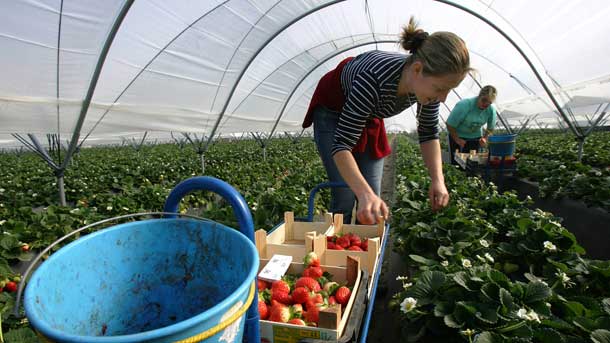The coronavirus crisis across Europe has forced many Bulgarian seasonal workers to return to their homeland. However, in the face of the seeming lack of choice, will they fill the vacant yet underpaid positions in the Bulgarian agriculture sector?
The question is becoming more and more difficult to answer - especially following the call by the European Commission that seasonal agricultural workers should "reach their destination without delay". And since employees perform critical functions related to the harvesting season, they need guarantees for their free border crossing, EU Member States say.
According to the annual report on labour mobility in the EU, Bulgaria is among the countries that send the highest number of workers to Europe.
 "Bulgaria is one of the five workforce donors in Europe, together with Romania, Poland, Italy and Portugal," Atanaska Todorova, chief expert at CITUB (Confederation of Independent Trade Unions in Bulgaria), told the Bulgarian National Radio. “Bulgarians are the preferred workforce. Most of our seasonal agricultural workers get employed in Spain - 350 thousand, and a total of 600 thousand people go to Germany and England. There are also employed Bulgarians in the agricultural sector in France, Italy, and Greece. ”
"Bulgaria is one of the five workforce donors in Europe, together with Romania, Poland, Italy and Portugal," Atanaska Todorova, chief expert at CITUB (Confederation of Independent Trade Unions in Bulgaria), told the Bulgarian National Radio. “Bulgarians are the preferred workforce. Most of our seasonal agricultural workers get employed in Spain - 350 thousand, and a total of 600 thousand people go to Germany and England. There are also employed Bulgarians in the agricultural sector in France, Italy, and Greece. ”
All these countries need a large number of foreign workers, otherwise their harvesting season will be jeopardized. And if the borders are opened, the chances of keeping Bulgarian seasonal workers in our native greenhouses and farms become seriously diminished.
"The question is what will be offered by the employers who have long said that the agricultural workforce is not sufficient," says Svetla Vasileva, chairperson of the Federation of Independent Trade Unions in Agriculture. “They need to ensure not only healthy and safe working conditions, consistent with government measures, but also decent pay. Currently, the European hourly rate in agriculture is much higher (in Germany - 8.50 euros, in Belgium - 9.80 euros, in Italy - 8.60 euros) than the hourly pay here, which is only 1.90 euros."
Employees from other sectors who have lost their jobs - not only in Bulgaria but also abroad - are also an opportunity to fill the vacancies in Bulgarian agriculture.
"An able-bodied person will be ready to enter the labour process in agriculture as there will be no other options for remuneration," said Svetla Vassileva. “These are many groups of people who will be laid off during the state of emergency across Europe. Some of them will be people who return to Bulgaria, while others will come from the tourism, hospitality and restaurant industries. So there will be opportunities in agriculture and farming, because that's where the lowest percentage of hired labour is."
The spread of the coronavirus outbreak jeopardizes the agricultural sector due to the paralyzing of the work of many farms both in Bulgaria and in Europe, which can further complicate the supply of products on the domestic and foreign markets, the expert predicts.
Edited by Diana Tsankova (interview of Maria Kostova from Horizont channel)
English Rossitsa Petcova
More than EUR 1 billion will be invested in agriculture and rural areas in Bulgaria in 2025. According to a decision by the Monitoring Committee of the Strategic Plan for Agricultural Development, the funds are aimed at modernizing agriculture and..
Bulgaria’s industry is being transformed in the direction of high added value productions, reads an analysis by the Institute for Market Economics. This tendency is best manifested in computer science, electronics and optics which account for the..
Acceleration of inflation to 1.1% in October compared to the previous month was registered by the National Statistical Institute. On an annual basis, the index is 1.8 percent. In October, the prices of goods and services for..
Butter and vegetable oil are the products that have increased in price the most over the year. The retail price of vegetable oil will range between 3..

+359 2 9336 661
